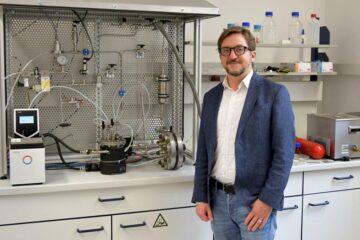Life Sciences in the European Research Council – The Scientists’ Opinion Meeting in Paris

The European Life Sciences Forum (ELSF), in conjunction with the European Molecular Biology Organization (EMBO), the Federation of European Biochemical Societies (FEBS), and the Division of Basic and Engineering Sciences of UNESCO, is organising a meeting on the prospects of establishing a European Research Council (ERC) to support high quality basic research in Europe. The event will take place at the UNESCO – Fontenoy Building in Paris, France on the 19 February 2003. The meeting is open to all life scientists, journalists and interested parties.
The purpose of this meeting is to generate a scientific perspective on the possibility of establishing an ERC complementary to the EC Framework Programme and the National Research Council programmes.
It is important that scientists, as the primary users, get actively engaged in the discussions very early in the process. This meeting will present an excellent forum for doing so,“ says Luc van Dyck, Executive Co-ordinator of ELSF.
At the meeting, four Nobel Prize Laureates, Werner Arber, Christiane Nüsslein-Volhard, John Sulston and Rolf Zinkernagel, will give their personal opinions on the subject. Furthermore, there will be time to discuss the issue with three panels of prominent life scientists and representatives from national funding agencies, international organisations and the European Commission.
Participants should register at Participation is on a first-come, first-serve basis due to space constrain. There is no registration fee.
Contact:
Dr Luc Van Dyck
Executive Co-ordinator
European Life Sciences Forum
Meyerhofstrasse 1, D-69117 Heidelberg
Tel.: +49 (0)6221 8891 552
Fax: +49 (0)6221 8891 210
e-mail: luc.vandyck@elsf.org
ELSF
The European Life Sciences Forum (ELSF) is a coalition of independent organisations representative or supportive of the life sciences, biotechnology and biomedical research communities in Europe. Its mission is to increase their visibility and impact in the public and policy-making arenas, to advance research and to promote the contribution of scientists to European society.
EMBO
The European Molecular Biology Organization (EMBO), established in 1964, actively promotes biosciences in Europe. It does this by developing a strong transnational approach to molecular biology and identifying measures that support research and the training of scientists in this area. EMBO places the emphasis on scientific criteria in all its activities.
FEBS
The Federation of Biochemical Societies is one of the largest organisations in European life sciences, with more than 40.000 members distributed among 36 Constituent and 5 Associated Member Societies throughout Europe. Since it was founded in 1964, FEBS mission has been to promote, encourage and support biochemistry, molecular cell biology and molecular biophysics throughout Europe in a variety of different ways.
UNESCO
UNESCO is the United Nations organization for education, science, culture and communication issues. UNESCO is the only organization of the United Nations family with a mandate for the basic sciences. The Division for Basic and Engineering Sciences (BES) forms part of the Sciences Sector of UNESCO. BES is responsible for promoting research and training in mathematics, physics, chemistry, life sciences and their applied branches (e.g. biotechnologies), engineering sciences and interdisciplinary areas in science, as well as for fostering the exchange of knowledge in these fields.
Media Contact
Weitere Informationen:
http://www.elsf.org.Alle Nachrichten aus der Kategorie: Veranstaltungsnachrichten
Neueste Beiträge

Ideen für die Zukunft
TU Berlin präsentiert sich vom 22. bis 26. April 2024 mit neun Projekten auf der Hannover Messe 2024. Die HANNOVER MESSE gilt als die Weltleitmesse der Industrie. Ihr diesjähriger Schwerpunkt…

Peptide auf interstellarem Eis
Dass einfache Peptide auf kosmischen Staubkörnern entstehen können, wurde vom Forschungsteam um Dr. Serge Krasnokutski vom Astrophysikalischen Labor des Max-Planck-Instituts für Astronomie an der Universität Jena bereits gezeigt. Bisher ging…

Wasserstoff-Produktion in der heimischen Garage
Forschungsteam der Frankfurt UAS entwickelt Prototyp für Privathaushalte: Förderzusage vom Land Hessen für 2. Projektphase. Wasserstoff als Energieträger der Zukunft ist nicht frei verfügbar, sondern muss aufwendig hergestellt werden. Das…





















